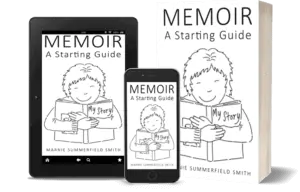
Memoirists who are writing about something they experienced in childhood often tell me that they feel that their first drafts are very much their inner child writing. Literally they feel she or he steps forward and takes over. And that adult them takes over in subsequent drafts, able to be more subjective and therefore able to craft the story for an audience.
One of my students in my Year Long Memoir Writing Course recently told me about her experience of this. She explained how her first draft emerged as a powerful testimony from her inner child – the one who had been abused and silenced for so long. The writing process became a form of liberation, allowing that younger self to finally step forward and share every detail of their experience. It was as if decades of silence were being broken, page by page. “It felt like a release,” she told me. “Like that child finally had permission to speak about what happened.”
Then, she explained further, “I’m working on the second draft now. And now that she’s had her say and shared every little detail of all the trauma, my adult voice is coming forwards.”
It seems as if, for this memoirist, with that initial unburdening complete, her adult voice naturally began to emerge. This more mature perspective started shaping the narrative, considering how to craft these raw experiences into a story that could truly connect with readers. Able to leave out some of the detail, about to chip away, to sculpt as I wrote about in this blog on editing here.
This reminded me of some writing advice from Stephen King, who by the way, has written an outstanding memoir on the craft of writing that I heartily recommend.
And it’s a hoot!
King says, “Write with the door closed, rewrite with the door open.”
I love this. And it also ties in with my advice about protecting your work from prying eyes too soon. Not from a lovely editor and mentor like me! But from friends and family members who may accidentally derail your progress with their subconscious or even conscious agenda. Even if they are well meaning…
So, for the first draft, write with the door closed, focusing solely on getting your story as you know it onto the page. Then, for the second draft, open that metaphorical door and consider your readers. How can you help them understand and connect with your experience? King’s quote captures the essential tension between creation and revision. Writing first drafts requires isolation and freedom from external judgment – that closed door represents the safe space where raw ideas can flow without self-censorship.
But revision demands perspective, which comes from opening the door to feedback and viewing your work through others’ eyes.
It’s a delicate balance – maintaining the authenticity of that first outpouring while crafting it into something that serves both writer and reader. But so often that’s exactly what makes memoirs so powerful: they’re both an act of personal healing and a bridge to universal understanding.
Need help writing your memoir? My £12 video masterclasses are here. And my six-part video course is also available.
My six-part course now gives you a month’s access to Marnie’s Memoir Mission – my accountability program for memoirists.
